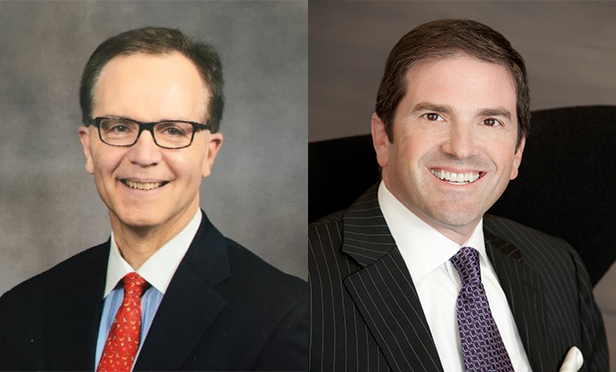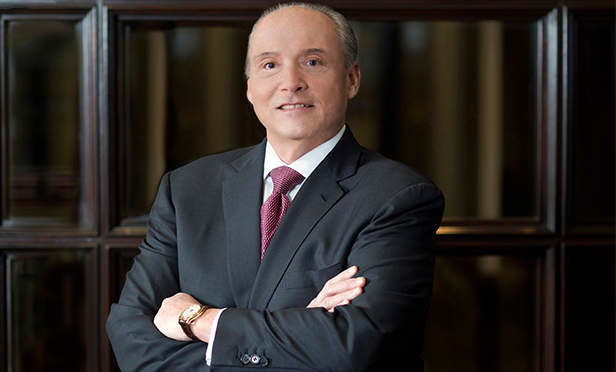
PHILADELPHIA—For the second year, leading commercial real estate market participants are organizing a breakfast salon meeting next week, featuring five senior market participants exchanging ideas, and talking about trends in the market that cross the lines of different sectors.
Brad Korman, co-CEO of Korman Communities and Jacob Reiter, president and chief investment officer of Verde Capital, are organizing the invitation-only breakfast, dubbed the “CRE Change Summit,” which will feature a panel discussion including Joseph Coradino from PREIT, discussing retail trends; Bill Hankowsky from Liberty Property Trust, to talk about his REIT's transition from office properties to industrial; Steve Klasko from Jefferson Health; and Jay Shah from Hersha Hospitality.
“Last year we had Richard Mack come in, who was one of the original Apollo [Real Estate Investment Fund] founders, and he talked about debt funds,” Reiter tells GlobeSt.com exclusively. “The concept is a continuation of bringing fresh ideas and content to real estate executives in this market. This year, adding to one CEO, we thought, 'let's get three or four.'”
The theme of the conversation is how the executives are adapting their companies to face change, Reiter says, and he hopes the conversation will be valuable to the audience, which is limited to about 100 or so market participants selected by Korman and Reiter. The pair are not organizing the conference for profit, but under the auspices of a commercial real estate professionals' affinity group known as JFRE. It's affiliated with the Jewish Federation of Philadelphia.
“The genesis was, how do we bring fresh ideas and thought leaders to this region to deliver content to real estate executives,” Reiter says. “We picked people who we really felt could benefit from the conversation.”
“Most of the people we've invited are principal-level people at real estate companies,” says Korman. “The theory is to bring thought leadership, really at the top of the game, at these public companies, to others in the real estate space.”
“These guys are chess players, they're thinking two, three, four moves ahead,” says Reiter. “I think it's helpful for people to hear and apply to their own businesses.”
“What these guys are talking about and how they relate to each other, we thought was the interesting aspect of this,” Korman says. “Any one of these guys could sit and talk for an hour and you'd be fascinated. But having them all together, where you can see the similarities and differences of how they think about the future and how they think about their business, we think is tremendously interesting.”

“It's probably one of the more exciting panels I've been on,” PREIT's Coradino tells GlobeSt.com exclusively. “It's really driven by the diversity of the panel.”
Having all the different sectors represented is key, Coradino says.
“On some level, all of those are relevant to one another,” he says. “We tend to operate in our silos, and I think it's really an opportunity to learn a little about healthcare, because by the way, in several of our malls, we have healthcare facilities. It's a great way to learn about the hotel business, because one thing our industry is very tuned into is densification. This is an opportunity to think about hotels as one use where you can densify the property.”
Coradino also sees important synergies between retail and industrial sectors, because mall tenants have logistics and distribution needs that are changing as Internet shopping affects retail patterns.
“Online shopping is less than nine percent of all shopping,” he says. “Bricks-and-mortar shopping gets 90 percent of the sales and only ten percent of the press. We'll grow at a sales clip as an industry somewhere between 3-4 percent as an industry this year, and projections for online shopping are in the teens, but the base is so small, that it's going to take approximately 20 years for online to grow to ten percent.”
Bricks-and-mortar stores and online are merging into “omnichannel” shopping, he says, including the phenomenon known as “BOPIS,” or “buy online, pickup in store.” That presents opportunities for retailers to provide smartphone apps and other online services to enhance the shopping experience, he says.

PHILADELPHIA—For the second year, leading commercial real estate market participants are organizing a breakfast salon meeting next week, featuring five senior market participants exchanging ideas, and talking about trends in the market that cross the lines of different sectors.
Brad Korman, co-CEO of Korman Communities and Jacob Reiter, president and chief investment officer of Verde Capital, are organizing the invitation-only breakfast, dubbed the “CRE Change Summit,” which will feature a panel discussion including Joseph Coradino from PREIT, discussing retail trends; Bill Hankowsky from Liberty Property Trust, to talk about his REIT's transition from office properties to industrial; Steve Klasko from Jefferson Health; and Jay Shah from Hersha Hospitality.
“Last year we had Richard Mack come in, who was one of the original Apollo [Real Estate Investment Fund] founders, and he talked about debt funds,” Reiter tells GlobeSt.com exclusively. “The concept is a continuation of bringing fresh ideas and content to real estate executives in this market. This year, adding to one CEO, we thought, 'let's get three or four.'”
The theme of the conversation is how the executives are adapting their companies to face change, Reiter says, and he hopes the conversation will be valuable to the audience, which is limited to about 100 or so market participants selected by Korman and Reiter. The pair are not organizing the conference for profit, but under the auspices of a commercial real estate professionals' affinity group known as JFRE. It's affiliated with the Jewish Federation of Philadelphia.
“The genesis was, how do we bring fresh ideas and thought leaders to this region to deliver content to real estate executives,” Reiter says. “We picked people who we really felt could benefit from the conversation.”
“Most of the people we've invited are principal-level people at real estate companies,” says Korman. “The theory is to bring thought leadership, really at the top of the game, at these public companies, to others in the real estate space.”
“These guys are chess players, they're thinking two, three, four moves ahead,” says Reiter. “I think it's helpful for people to hear and apply to their own businesses.”
“What these guys are talking about and how they relate to each other, we thought was the interesting aspect of this,” Korman says. “Any one of these guys could sit and talk for an hour and you'd be fascinated. But having them all together, where you can see the similarities and differences of how they think about the future and how they think about their business, we think is tremendously interesting.”

“It's probably one of the more exciting panels I've been on,” PREIT's Coradino tells GlobeSt.com exclusively. “It's really driven by the diversity of the panel.”
Having all the different sectors represented is key, Coradino says.
“On some level, all of those are relevant to one another,” he says. “We tend to operate in our silos, and I think it's really an opportunity to learn a little about healthcare, because by the way, in several of our malls, we have healthcare facilities. It's a great way to learn about the hotel business, because one thing our industry is very tuned into is densification. This is an opportunity to think about hotels as one use where you can densify the property.”
Coradino also sees important synergies between retail and industrial sectors, because mall tenants have logistics and distribution needs that are changing as Internet shopping affects retail patterns.
“Online shopping is less than nine percent of all shopping,” he says. “Bricks-and-mortar shopping gets 90 percent of the sales and only ten percent of the press. We'll grow at a sales clip as an industry somewhere between 3-4 percent as an industry this year, and projections for online shopping are in the teens, but the base is so small, that it's going to take approximately 20 years for online to grow to ten percent.”
Bricks-and-mortar stores and online are merging into “omnichannel” shopping, he says, including the phenomenon known as “BOPIS,” or “buy online, pickup in store.” That presents opportunities for retailers to provide smartphone apps and other online services to enhance the shopping experience, he says.
Want to continue reading?
Become a Free ALM Digital Reader.
Once you are an ALM Digital Member, you’ll receive:
- Breaking commercial real estate news and analysis, on-site and via our newsletters and custom alerts
- Educational webcasts, white papers, and ebooks from industry thought leaders
- Critical coverage of the property casualty insurance and financial advisory markets on our other ALM sites, PropertyCasualty360 and ThinkAdvisor
Already have an account? Sign In Now
*May exclude premium content© 2025 ALM Global, LLC, All Rights Reserved. Request academic re-use from www.copyright.com. All other uses, submit a request to [email protected]. For more information visit Asset & Logo Licensing.








